Vacation rental hosts and managers reveal the challenges costing them sleep in this year’s State of Short Term Rental Industry Study.
The 2024 study based on a survey of over 4,000 hosts and managers lifts the lid on some of the industry’s burning issues. This year’s study was organised by Rent Responsibly and the College of Charleston. It was sponsored by Superhog and other industry players.
In this post, we take an in-depth look at some of the key takeaways and ask industry experts to share their tips for dealing with these daily challenges
Read the full version of the State of Short Term Rental Industry Report.
The survey includes 4 categories of hosts and property managers:
Small – (1-5 properties)
Medium – (5-10 properties)
Big – (10-20 properties)
Very big – (20-plus properties)
Key Take-Aways: State of Short Term Rental Industry Study
- Biggest challenges for hosts and PMs
- Top revenue growth plans for 2024
- Local community support
- Guest damage and fraud

1. Biggest challenges
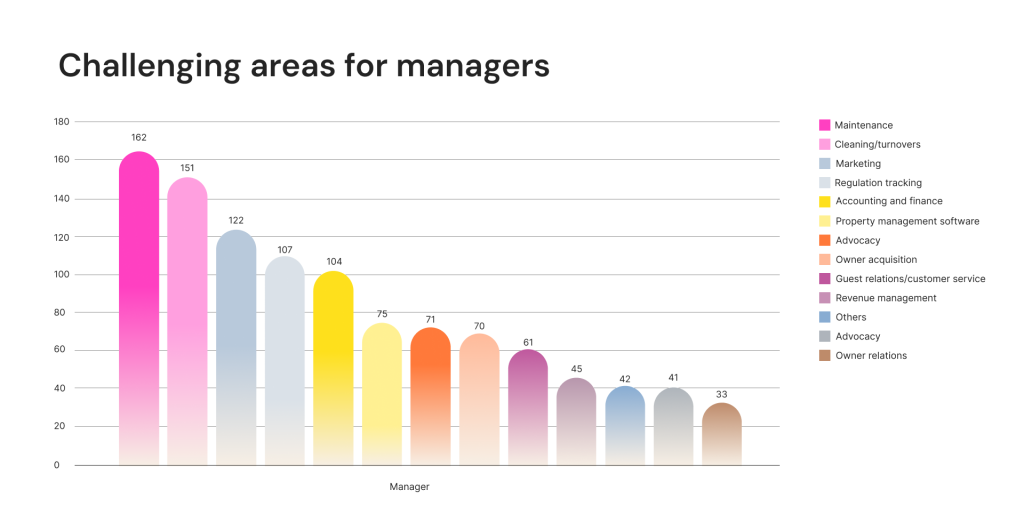
When asked which areas of property management they found most challenging, hosts and managers overall highlighted these challenges in order of priority:
| Challenging area | Percentage of PMs |
| Maintenance | 15% |
| Cleaning and turnovers | 14% |
| Marketing | 11% |
| STR Regulation Tracking | 10% |
Let’s take a closer look at these top industry challenges:
1.1. Maintenance
Maintenance of rental properties was the biggest headache in nearly every category of hosts, apart from very big companies of 20-plus properties, where cleaning and turnover was the predominant concern at 15%.
Why is maintenance a problem?
Every homeowner understands the need for maintenance because of the normal wear and tear that goes hand in hand with living, working, and sleeping in a home.
However, maintenance is a bigger issue for vacation rental owners or property managers because guests don’t look after a rental with the same level of care as if it were their own home. Also, guests expect the property to be in tip-top shape.

1.2 Cleaning and turnovers
Cleaning and turnovers are a challenge in every category of hosts, but the bigger the business, the more of a headache it becomes.
Smaller property hosts and owners rate cleaning and turnovers as their 4th biggest problem, after maintenance, marketing, and regulation tracking, compared to medium and big property category owners ranking cleaning and turnovers as their 2nd biggest problem. It ranks as the number one problem for managers in the category of very big (20-plus properties).
Why are cleaning and turnovers a problem?
When you go from 5 to 10 properties, the sheer workload and amount of time needed for cleaning and turnovers can become unmanageable without the help of a team.
In our post: Burnout in vacation rentals – is it time to quit? – Annette Grant, co-founder of the popular podcast Thanksforvisiting.com – explains how cleaning and turnovers caused a moment of burnout that was a turning point early on in her career as a host.
“This was several years ago when I was doing everything on my own, including messaging and cleaning. One day a guest messaged me to say they’d arrived. I checked and sure enough, they had booked and I had missed it because I had multiple properties and did everything manually. I hadn’t yet cleaned that property. In the end, honesty was the best policy. I apologised, cleaned the property, paid for their dinner and they gave me grace. But nowadays I do not think that would fly at all. I hired someone the very next day to help me because I did not ever want to feel that way again.”
Expert cleaning and turnover tips
Knowing when to appoint a team to help you and training them adequately, including having a documented and detailed cleaning policy to facilitate onboarding, will help to prevent cleaning or turnover bottlenecks and guarantee consistency in standards.
1.3 Marketing

Getting the word out about your business in a competitive industry is an issue for most hosts, apart from very big companies, where this function is often outsourced.
Why is marketing a problem?
You can have the most beautiful property, but if guests don’t know about your rental, your business won’t succeed. In a competitive industry, where there has been an explosion in OTAs and other distribution channels in recent years, standing out is a real challenge.
Expert vacation rental marketing tips
Lisa Roads, the Holiday Property Coach, a vacation rental brand strategist, says:
“You need to think about what is it you offer to whom and why. What is special about your property, your stay experience, your location and who are you trying to attract? No matter which OTA or channel you use, whether you use tech or relationships, people need to know what it is you’re offering, why it’s important to who, and why they should come and stay with you.”
1.4 Staying on top of changing short term rental industry regulations
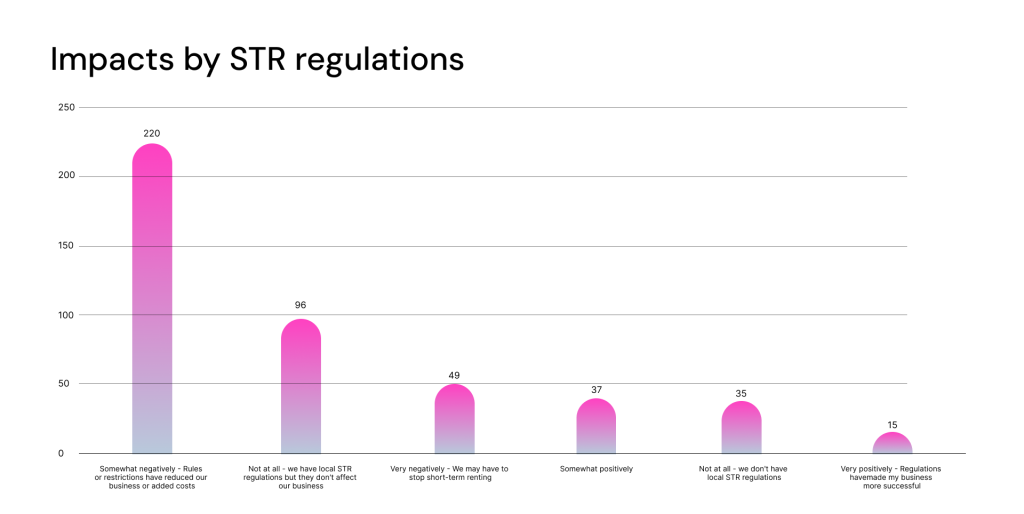
As the STR landscape shifts faster than quicksand under the feet of US hosts and managers, they need to stay on top of the latest regulations at all times. This is particularly the case for smaller business owners, who ranked this issue as their third biggest challenge at 14%. Managers of very big rentals of 20 properties or more, also ranked this as a top challenge at 9%. For someone already overwhelmed with the pressures of running a business, tracking the latest regulatory information can seem like an insurmountable task.
Read about the rising trend in STR – office-to-short-term-rental transition that’s taking place right in the centers of capital cities.
Why is regulation tracking a problem?
The laws are constantly changing and in some areas, hosts and PMs have to contend with local, state and national regulations. Being in breach of these regulations, could result in fines, denial of a VR licence or even the closing down of the STR business in some cases.
Smaller businesses may see a bigger impact on their bottom line, whereas for very big property managers new laws may cause them to have to reconsider their scaling strategy.
Expert tips for tracking short term rental industry regulations
Becoming a member of your local STR alliance and joining advocacy group such as Rent Responsibly is the best way of staying abreast of the latest STR regulations in the US.
“The best way to avoid over-regulation is to get involved in advocacy and create trust and credibility in our sector,” says Superhog CEO Humphrey Bowles.
“For any market that’s not regulated right now, it’s just a matter of time before there are regulations,” warns Taylor HIlls, co-founder of Effortless Rental Group in Denver.
Also read our his tips for How to get around STR restrictions – a cautionary tale.
Read about the impact of the 2023 STR laws in San Diego.
Learn what’s new in Denver Airbnb rules.
1.5 Accounting and finance

For hosts and managers of bigger and very big properties – accounting and finance rate among their top 4 concerns.
Why is accounting and finance a problem?
Many vacation rental hosts start off as accidental hosts who don’t understand revenue management. Getting their heads around the accounting and financial side of their businesses, particularly when scaling, is a major challenge.
Expert short term rental industry accounting and finance tips
“It’s still a vibrant market for those with an entrepreneurial spirit, and there’s money to be made. But it’s not a ‘get rich quick’ scene anymore. You’ve got to be strategic and proactive, especially with revenue management. If you’re not up to speed with the latest strategies, you could miss out on maximizing your profitability,” explains John de Roulet, Director of Revenue Management at Wheelhouse, and a key player at RevProf, a groundbreaking non-profit for revenue managers.
Find out if you’re making any of these 8 vacation rental budgeting mistakes.
1.6. Finding staff, guest reviews and other challenges
Other problems mentioned by interviewed hosts and managers include staff issues, and a stigma of STRs in local communities because of noise and other disturbances and problems with Home Owner Associations for managers in multi-property vacation rentals.
Negative guest reviews is another common issue for hosts and managers across the board – which highlights the need to consistently offer quality service.
Taylor Hills, Founder of Effortless Rental Group says:
“Our job is to provide exceptional guest experiences. Consistency is key – and the one area where hotels still have the competitive edge over vacation rentals, says Taylor. “Guests want to know what to expect. They don’t want any nasty surprises.”
2. How hosts and managers plan to grow revenue in ‘24
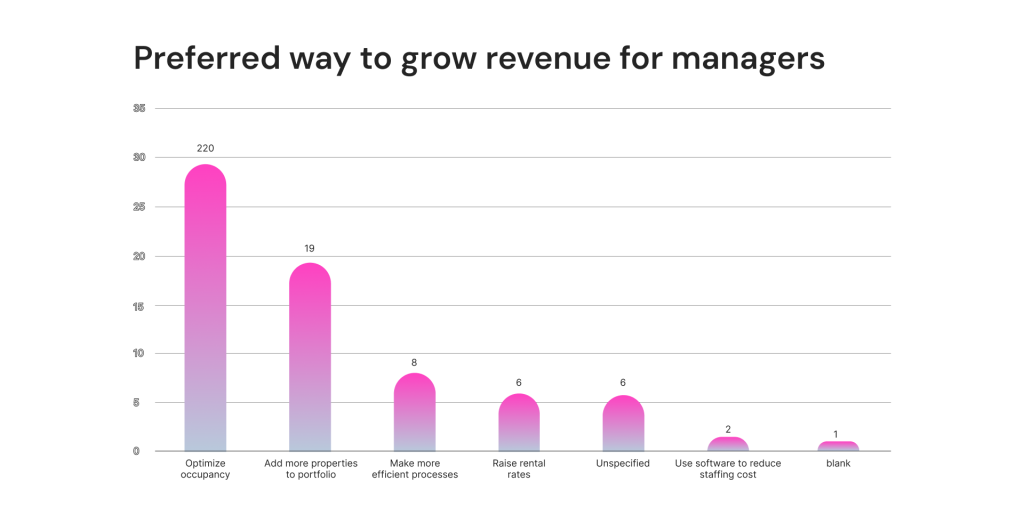
The industry is getting tougher and it’s harder to make money.
According to the State of the Short Term Rental Industry Study, 48% of surveyed small property hosts and 41% of medium-sized hosts plan to optimise occupancy over the next 12 months, followed by 23% of small rental hosts looking at adding properties, and 27% of medium rental hosts planning to do the same.
Only 12% of smaller hosts aim to raise rates, whereas 11% of medium rental hosts will look at making their processes more efficient before increasing rates.
For big and very big properties scaling is the number one priority over the next 12 months – 42% and 43 % respectively. Big properties will also focus on making processes more efficient, optimising occupancy and increasing rates, whereas very big rental managers are more likely to focus on occupancy and efficiency of processes, before increasing rates.
NOTE: Mid-term rentals was mentioned by some hosts as an additional planned source of income over the next year.
Expert vacation rental revenue growth tips
Ben Early, Co-founder and CEO of the multi-national hospitality brand, Holt, applies the same principles he used when he built profitable portfolios for clients in his previous life as a hedge fund manager to building his short term rental industry portfolio.
His advice is to prioritise quality over quantity for maximum profit: “It is much, much easier for someone else to pay you a very high nominal rate rather than hundreds of people to pay you a low nominal rate to create that business.”
See more of Ben Early’s vacation rental investing tips.
3. Short term rental industry impact on local businesses
Vacation rentals often get a bad rap in local communities, because neighbours complain about noise disturbances and the negative impact of having tourists on their doorstep.
What is interesting in this survey, is the fact that hosts and managers of small rentals, in particular, offer high levels of support to locally owned and operated businesses in their communities by purchasing their products or recommending products and services to their guests than the hosts in other categories.
In the survey, the number of small rental hosts who supported local businesses during the past 13 months, were:
1036 small operators – who supported between 6 and 10 local businesses
875 – who supported between 3 and 5 local businesses
605 – who supported between 11 to 20 businesses
In the accompanying chart, we see how the support from smaller rental hosts is far more significant than any of the other categories. The most common amenity hosts offer to their guests is personalized recommendations to local restaurants, attractions, and activities.
Expert tips for improving community relationships
It is important for vacation rental hosts to show their support for local businesses and also to make their support known, to counter the negative perceptions around STRs.
“I can’t say how important it is to be a face of your community and be that go to resource as much as you can. It has helped me grow my business so much on all levels.”
Listen to our podcast interview with John Hildebrand for more vacation rental tips.
4. Guest damage and fraud
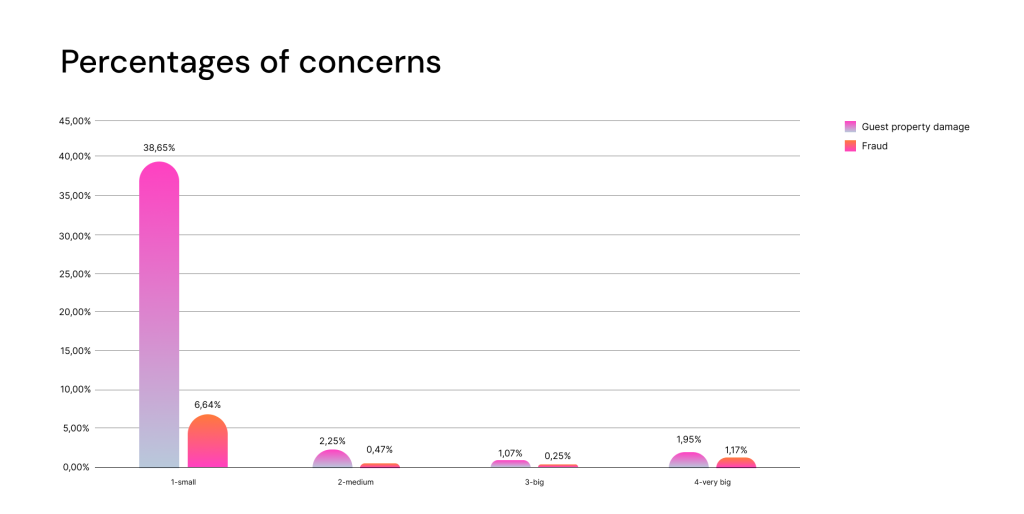
Guest property damage is a concern for hosts and managers of all-sized properties, although much more so for owners and hosts of small rentals – at 39% vs. only 2% for medium-sized rental hosts and very big property hosts and 1% for big property hosts.
Fraud, similarly, is of higher concern to smaller property hosts – at 7% compared to around 1% or less for all the other host categories.
Why smaller businesses are more concerned about safety and security?
Hosts of smaller rentals, which are typically self-owned, as we saw earlier – are more concerned about damage to their property by the ‘wrong’ guests, because it is their property.
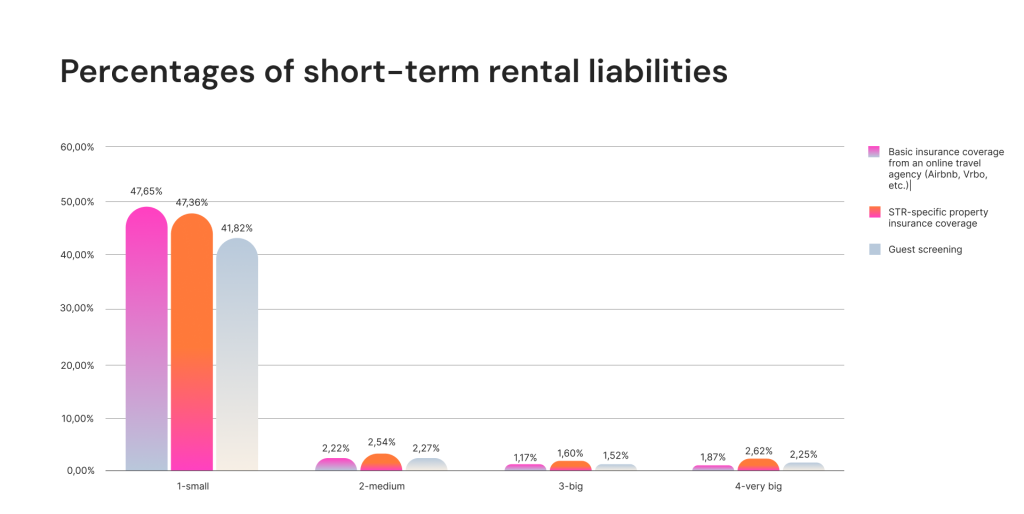
Use of Insurance, short term rental industry insurance and guest screening
In the survey, nearly half of the hosts of smaller vacation rentals opt for basic insurance, 48%, with the other half – 47% – opting for short term rental industry-specific insurance. Guest screening is used by 42% of small rental hosts to protect themselves against ‘bad’ guests.
In contrast, only around 2 % of managers and hosts in other categories use guest screening software to ensure the wrong guests don’t show up. STR insurance is used by 3% of medium and very big rental hosts, compared to 2% hosts of big companies. Normal insurance is used by 2% of medium and very big hosts and 1% of hosts of big rentals.
Use of guest screening technology
Around 8% of small rental hosts use guest screening software to verify the identity of guests, compared to 1% of very big hosts surveyed and 0% of the hosts in other categories.
Expert tips for avoiding guest damage and fraud:
Damage waivers and guest identity screening are essential methods for all-sized vacation rental hosts to take the headache out of ensuring your guests are who they say they are and to protect against guest damage.
In this Superhog success story, Cody Wood, of STR Accommodations explains how he uses damage waivers and guest screening to give him the edge.
“To offer safety and security policies to our homeowners, similar to the OTAs was a game changer and the biggest concern they had with direct bookings. It has allowed us to build confidence and trust with investors and made it easier to move guests away from the platforms and into direct bookings.”

